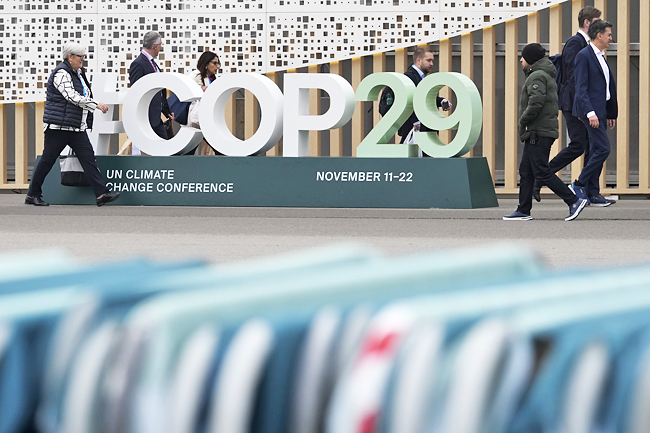AFP – The European Union (EU) yesterday raised an offer by rich nations to help poor countries worst hit by climate change to USD300 billion a year in a bid to salvage talks that the developing world warned were on the brink of collapse.
Negotiators worked through the night in a windowless sports stadium in the Caspian Sea city of Baku in a search for compromise as the two-week United Nations climate talks dragged into an extra day.
In a year set to be the hottest ever recorded, developing nations bearing the brunt of rising drought and disasters flatly rejected on Friday an initial offer of USD250 billion per year by 2035.
Two negotiators said the EU was urging that wealthy countries – whose ranks also include the United States, Britain and Japan – raise the sum to USD300 billion.
But this came with conditions in other parts of the broader climate deal under discussion at the COP29 conference in Azerbaijan, the negotiators added.

The Europeans in particular want an annual review on global efforts to phase out fossil fuels, which are the main drivers of global warming.
Irish Climate Minister Eamon Ryan said he was “hopeful” for a deal but that a clearer picture would emerge later in the day, when a new text is expected.
“We need to get an agreement. This is really important that we give hope to the world, that multilateralism can work, that we are responding to the climate crisis,” Ryan told AFP.
He said there was a recognition of the need for more money for the developing world, “but also we have to put a halt to the advance of fossil fuels.” Chair of the African Group of Negotiators Ali Mohamed told AFP that there had been “good discussions” on finance after the initial USD250 billion offer which he called “a big mockery”.
He said that developing nations had made clear that a lack of movement would “lead to a failure of COP”.
“No deal is better than a bad deal,” he said.
The stance of Mohamed was backed by a coalition of more than 300 activist groups that urged developing nations to stand firm.
In a letter, the non-governmental organisations accused developed nations of seeking to avoid legal obligations for climate finance. “You claim to champion a rules-based system, yet flout the rules when they don’t suit your interests, putting at risk billions of people and life on Earth,” they wrote.
Wealthy nations counter that it is politically unrealistic to expect more in direct government funding.
The US earlier this month elected President-elect Donald Trump, a sceptic of both climate change and foreign assistance, and a number of other Western countries have seen right-wing backlashes against the green agenda.
The draft deal posits a larger overall target of USD1.3 trillion per year to cope with rising temperatures and disasters, but most would come from private sources.
Even USD250 billion would be a step up from the USD100 billion now provided by wealthy nations under a commitment set to expire.
A group of developing countries had demanded at least USD500 billion, with some saying that increases were less than met the eye due to inflation.
Experts commissioned by the UN to assess the needs of developing countries said USD250 billion was “too low” and by 2035 rich nations should be providing at least USD390 billion.
This figure was taken up by Brazil, the host of next year’s COP30, which said USD390 billion should be the sole responsibility of wealthier countries.




